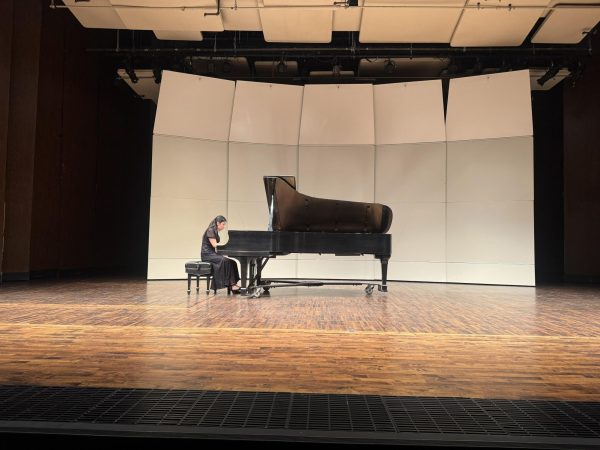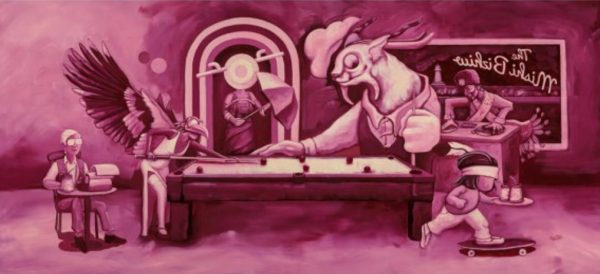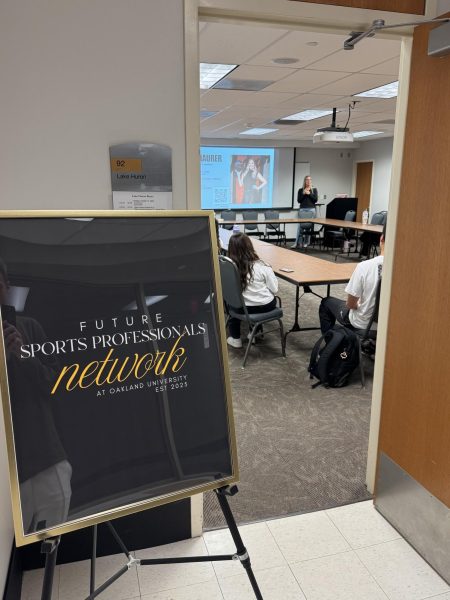Student Congress President, Vice President resign minutes before impeachment hearings
Photo courtesy of Perhogan/Jankowski
Former OUSC President Adeline Perhogan and Vice President Annabella Jankowski.
Oakland University Student Congress (OUSC) President Adeline Perhogan and Vice President Annabella Jankowski have both resigned prior to their impeachment hearings. Their resignation coincides with the resignation of four other Executive Board (E-Board) members and one Legislator since the beginning of the fall semester.
The E-Board spent the summer embattled with OUSC Legislators. The main issue dividing the sides was the apparent refusal to compensate Legislators for the hours they were working.
Despite OUSC specifically budgeting salaries for Legislators, Perhogan put off filing the necessary paperwork through the Office for Student Involvement (OSI) for Legislators to be paid. She did, however, follow the procedures for E-Board members to be compensated.
Perhogan, Jankowski and other E-Board members were paid while Legislators worked for free. This dynamic persisted throughout almost the entire summer despite repeated inquiries from Legislators about what they needed to do so Perhogan could complete their hiring process and they could be compensated.
“Several times I asked [Perhogan] to submit my paperwork,” OUSC Judiciary Chair Andrew Romano said. “It seemed like it was always another excuse to why they couldn’t get it submitted in time. After we budgeted for it, and after that was approved, and after the Handshake thing came up, then it was [a new excuse] … There was a resistance … it was being delayed as much as possible.”
OU uses a hiring service called Handshake for hiring. Student Organizations post ads on Handshake, students apply, then a hiring process is completed through the organization (in this case OSI) and Student Financial Services. Students cannot receive compensation for their work until this process is completed and OSI has a policy of refusing any back pay.
To help combat any confusion over compensation, Legislators began working on specific legislation outlining procedures to make sure that everyone could be compensated moving forward. This was met with resistance from OSI Senior Director and OUSC advisor Jean Ann Miller. Tension came to a head during a meeting last May.
“Jean Ann was upset with me for pushing for Legislator compensation,” OUSC Legislative Affairs Director Jordan Tolbert said. “ … The main argument that I had for wanting people paid was that I thought that not having Legislators paid [while paying the E-Board] creates a hierarchy …[Miller] said, ‘Why not have a hierarchy? They work harder for their positions. It’s harder for them to get these positions than it is for you.’ And I was like, ‘No, it’s not. [E-Board members] get hired in and we have to go through a whole process to become a legislator’ … She had been very adamantly against it the whole time. I wanted it done. I thought we could do stipends. She said no. I thought that we could do [less] hours. She tried to say no, whatever it was like she just didn’t like it … and was actively involved in resisting Legislators getting paid. At that meeting, she pretty much just ripped into me.”
The Post reached out to Miller. She declined giving an interview at this time. Though, according to Tolbert, she apologized generally to all involved in that meeting shortly afterwards.
Following that meeting, OUSC passed a budget for the summer semesters that allowed for a maximum of $32,307 of compensation for E-Board members and a maximum of $12,936 for Legislators. President Perhogan and Vice President Jankowski were budgeted a maximum of 30 and 40 hours per week respectively. The other E-Board members were budgeted maximum hours between 10 and 20 hours per week. Legislators were budgeted maximums between five and eight hours per week.
It is worth noting that it is not uncommon for student workers in SAFAC organizations to work less than their maximum budgeted hours. According to the budget spreadsheet, actual money paid out in salaries was $7,450 total for E-Board members and $0 total for Legislators. These numbers are contested as being incorrect by former Director of Financial Affairs Ethan Bradley, who says the sheet is outdated and that he hadn’t updated it updated since July 12. He also says those figures were incorrect at the time because he copied some numbers wrong.
According to Bradley, based on the hours in OUSC’s summer time sheet, the accurate figures for money paid out is $16,291 for E-Board members, and $473 for the few Legislators who managed to get their paperwork completed.
Despite passing the budget in June and OUSC rules at the time allowing for Legislators to be paid, compensation was put off until a bill laying out specifics for Legislator pay could be passed. According to Bradley, the point of waiting until this bill could pass was to prevent Legislators making arbitrary changes to the payment plan. That bill passed on July 26. Still, compensation for Legislators did not follow for weeks.
It is worth noting that Legislators were not compensated during last winter semester either despite funds being budgeted for their salaries. According to then-President Ethan Bradley he made attempts to post Handshake ads that fell through.
“I submitted the form to have legislative positions posted on Handshake multiple times and somewhere beyond my control it fell through so that the application was never posted,” Bradley said.
His statement is consistent with what’s written in the Feb. 9 meeting minutes executive report, which says “President Bradley said … He has resubmitted the request for the Legislative Chair position on Handshake as it is still not up.”
After two consecutive semesters of struggling for compensation, Legislators refused to pass a budget for the fall semester. Without a budget being reconciled, no one in OUSC was being paid. Gridlock with the legislature and not being paid was enough for some members of the E-Board to resign, others were facing articles of impeachment.
On Sept. 13, Vice President Jankowski resigned minutes before her impeachment hearing and Director of Student Services Bailee Gierman resigned. On Sept. 16, Director of Financial Affairs Ethan Bradley and Director of Sustainability Mallory Kean resigned. On Sept. 20, President Perhogan resigned minutes before her impeachment hearing and Director of Marketing Jadah Fletcher resigned.
The organization is now working to reset and fill vacant positions. Following these resignations, the two remaining members of the E-Board are Director of Diversity & Inclusion Murryum Farooqi and Student Activities Funding Board Chair Alex Garcia. Steering Chair of the Legislature Jeremy Johnson now serves as acting President until elections can be held. He has uploaded ads onto Handshake so whoever the next president is can have options to fill these positions.
The Post will be following up on this story with specific details on budgeting and compensation, as well as allegations of harassment and retaliation that occurred within the organization.
In addition to Miller — Perhogan, Jankowski and OUSC advisor Jessie Hurse were all approached for an interview prior to this article being published. They have yet to respond.
This article was last updated 7:56 p.m. Sunday, Sept. 26.









Anonymous • Sep 29, 2021 at 10:11 PM
If money was budgeted why weren’t they getting paid? Just because they were working less hours? Sounds like a hierarchy because actual management pays employees.
Legislator • Sep 26, 2021 at 11:59 PM
What the previous commenter said about the compensation bill, is misinformed. I actually wrote the compensation bill along with Adeline Perhogan, who was the co-sponsor of the bill. Annabella and Ethan also were signed supporters of the bill. Therefore, I would hope the bill was correct. Unfortunately even after the bill passed, they failed to act on what it called for and submit legislator paper work.
Anonymous • Sep 26, 2021 at 11:02 PM
Jordan Tolbert joined OUSC as a very naive legislator during my time with OUSC. While our overlap was short it was entirely unpleasant. She made it very clear that she did not intend to follow OUSC or university protocol or guidelines. She did not respect the traditional format of the meetings. She often asked questions that had already been answered in great detail. I am sure she learned more about the organization since she has been there for some time now but when she began she had little interest in it. I would be astounded if she had actually taken the proper route to pass the legislature compensation bill. I have serious doubts in the validity of this article since many of the people involved did not offer a comment.
Barry G. • Sep 26, 2021 at 7:34 PM
Whether or not paperwork has been filed is legally irrelevant. If the position is a compensated position, and if the hirer allows the hiree to begin work without that paperwork being filed properly, the hirer is still liable for paying the hiree. Someone needs to run this by the OU legal team, because this could end up being a major lawsuit. Something that we really don’t need right now.
Anonymous • Sep 26, 2021 at 4:39 PM
No way an actual ‘faculty member’ wrote that. Embarrassing.
Anonymous • Sep 26, 2021 at 9:35 AM
First, as a faculty member and someone not that much older than the students, please allow me to say: Do your job! Fill out paperwork when you’re supposed to fill out paperwork. Turn in things by a deadline well known to you. Answer your emails. This is literally the least any functioning adult should be capable of doing, and yet it seems like it’s impossible for a LOT of you students. I don’t know who told you this is how an adult acts, but grow up. Now, if this article’s details are correct, that sounds exactly like what happened here. And so resignation was the right decision, because you’re adults who asked for a job and then didn’t do it.
Second, the current OU Board of Trustees is implementing a plan of action. We’ve had a significant turn over in administration in a very short amount of time. Administrative communications to faculty are getting progressively more insulting and disrespectful. Attempts by student employees to unionize are being met with retaliation. Any suggestion to make the campus a better place, even if they are zero cost to the university, are met with outright refusal because they did not originate with the Board itself. There is a petty animosity in the administration that wasn’t there 2 or 3 years ago. And this inappropriate behavior by the administration and the administrators has, unfortunately, reached into student government. One of the other commenters on this article, Zach, thoughtfully shared his opinion. But, with all due respect, this is not the same administration you knew. Your doubts about the merits of this article are based on experiences that are no longer accurate reflections of the current Oakland University.
Zack Thomas, Former Student Body President (2016-17) • Sep 25, 2021 at 9:47 PM
The students of OU should absolutely be concerned by what is happening here. And, students should understand that the majority of Jordan Tolbert’s contentions here are either inaccurate in a significant way or entirely without merit.
First, every single organization (governments, universities, businesses) that functions effectively in this world has a “hierarchy.” That is just another word for management or accountability structure. That she uses “hierarchy” as a buzzword for something negative speaks to her – quite baffling – lack of understanding as to how OUSC (or any organization) is supposed to work.
Second, on the relative difficulty to become a Legislator, Tolbert is partly (but partly in a significant way) incorrect. The main ways students become Legislators on OUSC are two-fold: (1) winning an election, which is usually a default win. This method is without a doubt easier than hiring onto the Executive Board. Since there are almost never enough candidates to render the election “contested,” as long as a candidate for Legislator files properly and abides by deadlines, one is always going to win without difficulty. (2) After the election period has expired, Tolbert is correct that new prospective Legislators have an appointment process which has several requirements: a petition of 25 signatures, attending a few OUSC meetings, performing two “office hours,” and being accepted by the Legislature. However, those requirements may be made less difficult by a vote of the Legislature at any time. Indeed, they were more difficult when I was Student Body President, so the Legislature knows it can make its requirements less difficult. Why not lessen the requirements – instead of using these self-imposed requirements to justify budgeting $12,000+ to pay yourselves?
Third, Legislators are not expected to perform even close to the level of responsibilities of the Executive Board members. One, Legislators are not subject to any effective management or accountability structure, (but the Executive Board is subject to direct management by the Student Body President; and the Student Body President and VP are subject to substantial oversight by the Legislature). Two, Legislators – though without a doubt indispensable to the overall body – are not *required* to do much, while Executive Board members are *required* to put in substantial hours. Even though Tolbert has valid concerns about the current requirements that Legislators perform (1) one office hour per week, and (2) for two or three leadership positions on the Legislature — including Tolbert’s current position — there are additional requirements… those concerns are best resolved through taking action to change those responsibilities. For instance, the Legislature could very easily vote to eliminate the one-office-hour-per-week requirement which it has imposed on itself, without the need to increase pay. Instead, the Legislature effectively destroyed this OUSC administration by attempting to allocate such a substantial amount of student tuition dollars to itself, then held OUSC’s budget hostage, requiring actual staff members to go without pay, and then forced resignations when the E-Board was reluctant to implement a terrible idea. It was improper and alarming that the Legislature took this course of action.
In sum, students should be left entirely unconvinced by Tolbert’s contentions here. They should be upset with how the Legislature – in choosing to pay itself – is deciding to spend student tuition dollars. They should be concerned that there is currently no check (not even political – since Legislator elections are almost always uncontested) on the Legislature increasing its own pay. And they should be upset that Tolbert and her Legislature have brought difficulty to the Student Body’s choice to democratically elect Adeline Perhogan and Annabella Jankowski as their primary student leaders.